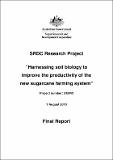| Other Contributor | Schmidt, S |
| Other Contributor | Schenk, P |
| Other Contributor | Lakshmanan, P |
| Date Accessioned | 2013-10-17 |
| Date Available | 2013-10-17 |
| Issued | 2010 |
| Identifier | http://hdl.handle.net/11079/12685 |
| Abstract | This project addresses the knowledge gap of how management affects soil biological processes. This is important because management has to maximise soil health and nutrient relations. Knowledge of soil biology in context of management strategies will allow optimising economic and environmental outcomes for the sugar industry. The project assessed how management options of the ‘new sugarcane farming system’ (reduced tillage, legume break crop, trash blanketing, and reduced nitrogen (N) fertiliser application), impact soil biology. We examined the functional groups and activity of soil microbes in context of soil N availability and gaseous emissions. Sugarcane soils in North and Southern Queensland, including the Yield Decline Joint Venture site in Ingham and two commercial farms with contrasting management practices in Bundaberg, were used for this research. A suite of well established and new methods were applied to analyse soil biological processes. A focus on soil microbiological processes is justified because microbes are the main drivers of N turnover in soil. Microbes supply N to crops by breaking down complex organic matter and soil-bound N, but also compete with plants for more easily-accessible N. Microbes convert N into easily leachable nitrate and gaseous N forms and are drivers of carbon (C) turnover in the soil. These microbial processes have not been comprehensively studied in sugarcane soils with different management. A special focus of this study was the development and application of novel molecular techniques to monitor soil microbial gene expression. This approach allows microbial functional analysis by treating soil as a “super organism” rather than deducing function from the presence of particular microbial taxa which is biased towards known microbial taxa. |
| Language | en |
| Part of Series | Internal Report; 2010 UQ043 |
| Subject | Soil biology |
| Subject | Farm management practices |
| Subject | New farming system |
| Subject | Soil microbes |
| Subject | Nutrient cycling |
| Subject | Nutrient status |
| Subject | Molecular techniques |
| Subject | Soil nitrogen (N) and carbon (C) dynamics |
| Subject | SYDJV |
| Subject | Soil N availability and gaseous emissions |
| Subject | Soil biological processes |
| Subject | Microbial functional analysis |
| Subject | Monitoring soil microbial gene expression |
| Subject | N fertiliser rates |
| Subject | Microbial activity |
| Subject | Isolation and analysis of mRNA |
| Subject | N availability |
| Title | SRDC Research Project Harnessing soil biology to improve the productivity of the new sugarcane farming system |

